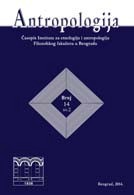TEXT AS LABORATORY: SCIENCE FICTION LITERATURE AS ANTHROPOLOGICAL THOUGHT EXPERIMENT
TEXT AS LABORATORY: SCIENCE FICTION LITERATURE AS ANTHROPOLOGICAL THOUGHT EXPERIMENT
Author(s): Ilina Jakimovska, Dragan JakimovskiSubject(s): Anthropology, Studies of Literature, Methodology and research technology
Published by: Институт за етнологију и антропологију
Keywords: anthropology;science fiction; thought experiment; methodology;
Summary/Abstract: Thought experiments in the physics of the 20th century played a crucial role in the development of theoretical concepts, especially in absence or unsuitability of experimental data. In social sciences, for ethical and other reasons, the very utilization of the experiment as a methodological tool has been highly disputed. Thus, it has not only been rarely performed, but its implications, if any, had almost no practical value. Science fiction as a genre is perfectly suited to complement an actual performing of an experiment in anthropology, providing hypothetical scenarios that serve to predict possible future(s) of humanity, but that are, at the same time, challenging prevailing theories and even trying to establish new ones, by moving current theoretical problems into another, more helpful and more constructive territory, the one of the thought experiment. The article examines a number of short stories belonging to the science fiction genre that deal with core anthropological issues such as the definition of 'human', the role of adaptation in human evolution, the development of social groups and establishment of complex societies, appreciation of other cultural systems and the relation of humans to the universe. By doing this, it promotes the utilization of science fiction not only as methodological tool for research purposes, but even more as a valuable tool for teaching anthropology.
Journal: Antropologija
- Issue Year: 10/2010
- Issue No: 2
- Page Range: 53-63
- Page Count: 11
- Language: English

